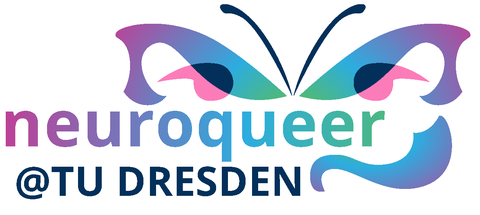Neuroqueer@TUD
Open workshop "Neurodiversity and University" successfully held on 08.10.2024!
Studying neurodivergently is associated with great potential, but also with barriers. The TU Dresden defined the goal of being an inclusive university and constantly improving study conditions by removing barriers. The practical implementation of this goal for neurodivergent students and any need for action was the subject of an open workshop, which took place on 08.10.2024 from 13:00 - 16:00 in the Faculty of Computer Science room E023.
The workshop took place with around 20 interested participants in parallel to the first semester induction week, meaning that primarily students from higher semesters or employees took part. In addition, several people interested in the workshop and the resulting materials registered but could not participate. The participants gave very positive feedback on the content and topics of the event via feedback sheets and in personal discussions, where the helpfulness of the presented information was highlighted. The workshop created a pleasant and private atmosphere, which enabled intensive participation. Participants could further contribute questions, comments, or experiences with a collaborative online document during the whole workshop.
In addition to basic aspects of neurodiversity, in particular AD(H)S and autism, the workshop provided practical recommendations, contact points, and self-support recommendations for students with AD(H)S or autism at TU Dresden. The results of qualitative surveys of neurodivergent students conducted as part of the Neurodivergent@TU Dresden and Neuroqueer@TUD projects were then presented. Furthermore, recommendations for action for the TU Dresden based on the results of the surveys were discussed.
The workshop is organized and conducted by the research project AutARK and the project management of Neurodivergent@TUD Lars Bönsch.
If you have any further questions or requirements regarding participation in the event in advance, please contact us by e-mail at: or .
What is neurodiversity?
Neurodiversity is a concept that recognizes the diversity of people in the way they think and feel. The term is discussed particularly strongly in the context of autism and ADHD communities and their strong overlaps.
The neurodiversity paradigm assumes that a neuronormative society disables those affected, while their neurological conditions are not necessarily seen as disorders. Many of those affected perceive their difference as an enrichment. Which of these facets predominate is very individual and can vary greatly from one stage of life to the next and from person to person, depending on the context.
Studying at a university as large as TU Dresden can be very enriching due to the variety of advisory services and interest groups. However, freedom and the lack of structures can be particularly overwhelming for people on the ADHD spectrum. According to the results of a survey of neurodivergent students at TU Dresden 2023/2024, administrative processes and problems with access to compensation for disadvantages also mean that many of those affected do not feel recognized with their needs, which highlights the potential for action to improve the study situation of neurodivergent students.
Information about the Project
The neuroqueer@TUD project, which is funded by the Equality and Diversity Incentive Fund, will start in at march 2024. This focuses on the academic situation and conditions of neurodivergent, queer people and thus addresses intersectional aspects and their effects on university studies.
The project can be seen as a follow-up project to neurodivergent@TUD, which examined the needs of neurodivergent students more closely in 2023 and initiated an exchange format as part of a regulars' table.
Summary of the Project
Gender identity and experiences on the neurodivergent spectrum are interacting. Inaccurate diagnostic procedures result, among other things, in the fact that people who have been socialized as girls are often not diagnosed with autism until they have completed school. However, since early therapeutic support for neurodivergent people is an important indicator of academic success, this can have consequences for everyday university life. Neuroqueer@TUD is based on the results of neurodivergent@TUD project and examines intersectional aspects of gender identity and neurodivergent with an impact on academic success.
Funded by the Federal Ministry of Education and Research (BMBF) and the Freestate of Saxony under the Excellence Strategy of the Federal Government and the Länder.

